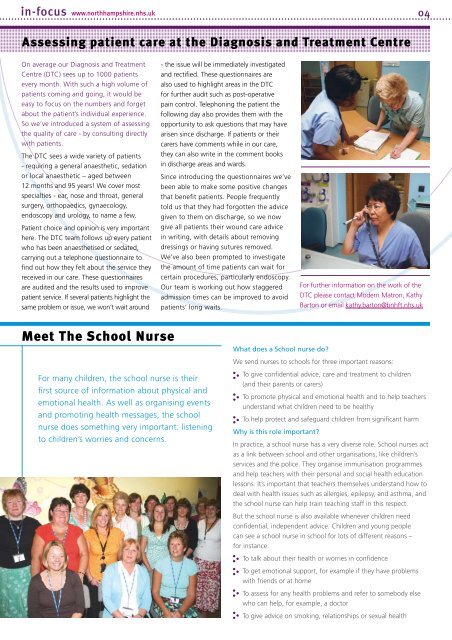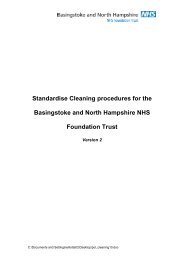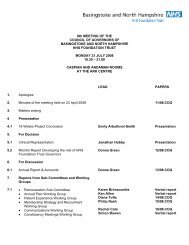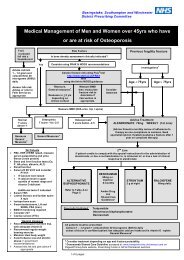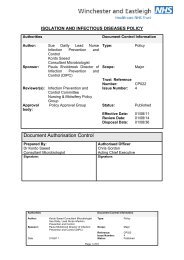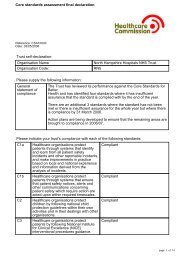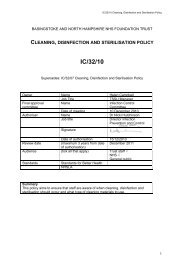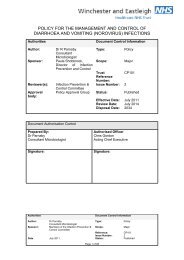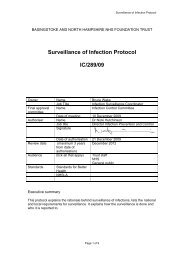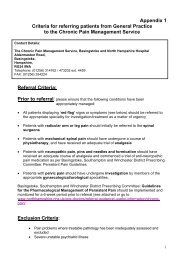InFocus Magazine 2007 - Hampshire Hospitals NHS Foundation Trust
InFocus Magazine 2007 - Hampshire Hospitals NHS Foundation Trust
InFocus Magazine 2007 - Hampshire Hospitals NHS Foundation Trust
Create successful ePaper yourself
Turn your PDF publications into a flip-book with our unique Google optimized e-Paper software.
04<br />
Assessing patient care at the Diagnosis and Treatment Centre<br />
On average our Diagnosis and Treatment<br />
Centre (DTC) sees up to 1000 patients<br />
every month. With such a high volume of<br />
patients coming and going, it would be<br />
easy to focus on the numbers and forget<br />
about the patient’s individual experience.<br />
So we’ve introduced a system of assessing<br />
the quality of care - by consulting directly<br />
with patients.<br />
The DTC sees a wide variety of patients<br />
- requiring a general anaesthetic, sedation<br />
or local anaesthetic – aged between<br />
12 months and 95 years! We cover most<br />
specialties - ear, nose and throat, general<br />
surgery, orthopaedics, gynaecology,<br />
endoscopy and urology, to name a few.<br />
Patient choice and opinion is very important<br />
here. The DTC team follows up every patient<br />
who has been anaesthetised or sedated,<br />
carrying out a telephone questionnaire to<br />
find out how they felt about the service they<br />
received in our care. These questionnaires<br />
are audited and the results used to improve<br />
patient service. If several patients highlight the<br />
same problem or issue, we won’t wait around<br />
- the issue will be immediately investigated<br />
and rectified. These questionnaires are<br />
also used to highlight areas in the DTC<br />
for further audit such as post-operative<br />
pain control. Telephoning the patient the<br />
following day also provides them with the<br />
opportunity to ask questions that may have<br />
arisen since discharge. If patients or their<br />
carers have comments while in our care,<br />
they can also write in the comment books<br />
in discharge areas and wards.<br />
Since introducing the questionnaires we’ve<br />
been able to make some positive changes<br />
that benefit patients. People frequently<br />
told us that they had forgotten the advice<br />
given to them on discharge, so we now<br />
give all patients their wound care advice<br />
in writing, with details about removing<br />
dressings or having sutures removed.<br />
We’ve also been prompted to investigate<br />
the amount of time patients can wait for<br />
certain procedures, particularly endoscopy.<br />
Our team is working out how staggered<br />
admission times can be improved to avoid<br />
patients’ long waits.<br />
For further information on the work of the<br />
DTC please contact Modern Matron, Kathy<br />
Barton or email kathy.barton@bnhft.nhs.uk<br />
Meet The School Nurse<br />
What does a School nurse do?<br />
We send nurses to schools for three important reasons:<br />
For many children, the school nurse is their<br />
first source of information about physical and<br />
emotional health. As well as organising events<br />
and promoting health messages, the school<br />
nurse does something very important: listening<br />
to children’s worries and concerns.<br />
To give confidential advice, care and treatment to children<br />
(and their parents or carers)<br />
To promote physical and emotional health and to help teachers<br />
understand what children need to be healthy<br />
To help protect and safeguard children from significant harm<br />
Why is this role important?<br />
In practice, a school nurse has a very diverse role. School nurses act<br />
as a link between school and other organisations, like children’s<br />
services and the police. They organise immunisation programmes<br />
and help teachers with their personal and social health education<br />
lessons. It’s important that teachers themselves understand how to<br />
deal with health issues such as allergies, epilepsy, and asthma, and<br />
the school nurse can help train teaching staff in this respect.<br />
But the school nurse is also available whenever children need<br />
confidential, independent advice. Children and young people<br />
can see a school nurse in school for lots of different reasons –<br />
for instance:<br />
To talk about their health or worries in confidence<br />
To get emotional support, for example if they have problems<br />
with friends or at home<br />
To assess for any health problems and refer to somebody else<br />
who can help, for example, a doctor<br />
To give advice on smoking, relationships or sexual health


